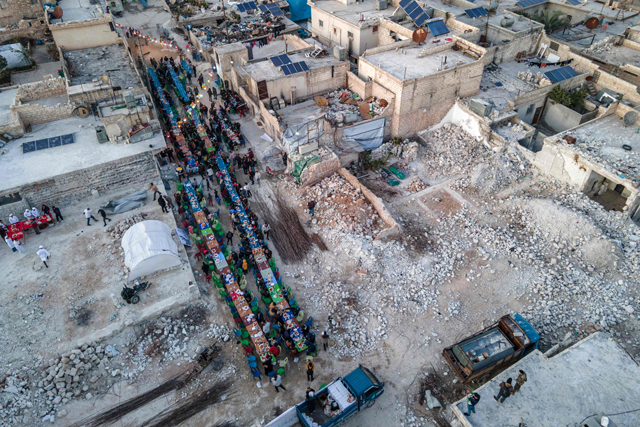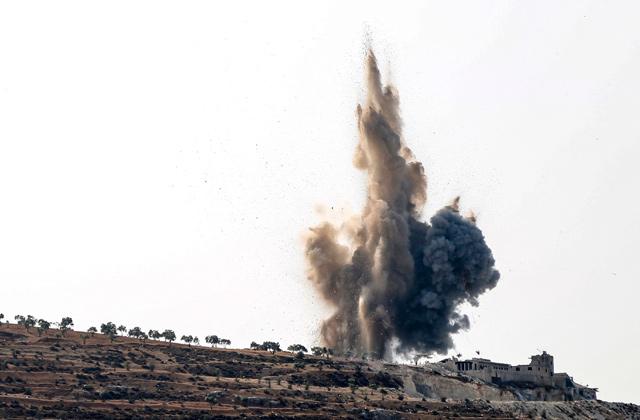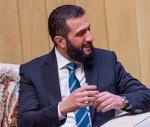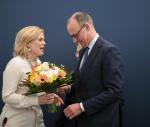You are here
Israeli strikes wound five Syrian soldiers — state media
By AFP - Apr 02,2023 - Last updated at Apr 02,2023

This aerial view shows locals affected by the February 6 earthquake attending a mass iftar — the fast-breaking meal at sunset — in the town of Atareb in the rebel-held western countryside of Aleppo province on March 31 at the end of the fasting day during the holy month of Ramadan (AFP photo)
DAMASCUS — Five Syrian soldiers were wounded in the latest Israeli air strike on Syria, state news agency SANA reported Sunday, with Iran saying two Revolutionary Guards officers died in earlier attacks.
The strike early Sunday near the western Syrian city of Homs was Israel's third in recent days after the capital Damascus was targeted on the nights of March 30 and 31, according to the agency.
"The Israeli enemy carried out an air assault... targeting positions in the city of Homs and its province," SANA reported, citing a military source.
Syria's air defence intercepted several missiles, but five soldiers were wounded and some material damage was reported, SANA said.
The Syrian Observatory for Human Rights, a Britain-based war monitor, said the strikes targeted several military positions of Syrian government forces and pro-Iran groups.
The monitor said explosions rocked the city and a fire broke out in a research centre, with ambulances heading to the scene of the attack.
Observatory head Rami Abdel Rahman told AFP that in addition to the five wounded Syrian soldiers, several Iran-affiliated fighters in the research centre had been killed in the strikes.
“An arms depot belonging to Lebanese Hizbollah forces in the military airport of Dabaa, in the south-western sector of Homs, was destroyed,” he added.
In the strikes on Friday, Israel launched “several missiles from the occupied Golan Heights” against positions near Damascus, Syrian state media said.
The observatory said those strikes had targeted a weapons and ammunition depot of the Syrian military and pro-Iran groups.
‘It will pay’
Sepahnews, the website of Iran’s Islamic Revolutionary Guard Corps, said on Friday that officer Milad Heidari had been killed.
On Sunday, the website reported that Meghdad Mahghani, a military adviser wounded in the same strike, had “attained the high rank of martyrdom”.
It added that “the crimes of the fake and criminal Zionist [Israeli] regime will not go unanswered, and it will pay”.
Iranian foreign ministry spokesman Nasser Kanani condemned that attack, saying on Sunday that the “blood of these high-ranking martyrs will not go to waste” and that Tehran “reserves its right to respond... at the appropriate time and place”.
Israel conducted several air strikes on Syria in March, according to the observatory, which has an extensive network of sources in the country.
While Israel rarely comments on the strikes it carries out on Syria, it has repeatedly said it will not allow its arch-foe Iran to extend its footprint in the war-torn country.
Israeli Prime Minister Benjamin Netanyahu, speaking after the strike on Sunday, said: “We are exacting a high price from the regimes that support terrorism, beyond Israel’s borders. I suggest that our enemies not err.”
Israel has seen weeks of protests against a controversial judicial overhaul now frozen by the government, but Netanyahu said that domestic politics would not stop its military.
“Israel’s internal debate will not detract one iota from our determination, strength and ability to act against our enemies on all fronts, wherever and whenever necessary,” he added.
Last week, an Israeli missile strike destroyed a suspected arms depot used by Iran-backed militias at Syria’s Aleppo airport, the war monitor said.
On March 7, three people were killed in an Israeli strike on the same airport that put it out of service. It reopened three days later.
And in February, an Israeli air strike killed 15 people in a Damascus district that houses state security agencies, the observatory said at the time.
The Syrian war broke out in 2011 with the brutal repression of peaceful anti-government protests, and escalated into a deadly armed conflict that pulled in foreign powers and global extremists.
Some 500,000 people have been killed and around half of Syria’s pre-war population has been forced from their homes.
Related Articles
DAMASCUS — Israel carried out air strikes in Syria near the government-held city of Homs, Syrian state media reported on Sunday, and the Isr
DAMASCUS — An Israeli missile strike wounded two Syrian soldiers near Damascus on Saturday, the official SANA news agency reported after exp
BEIRUT — A war monitor said Israeli strikes on Syria early on Sunday targeted at least two sites in Damascus province including a weapons de
















